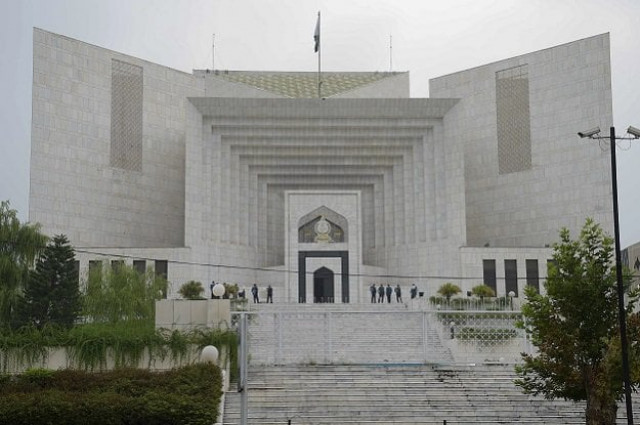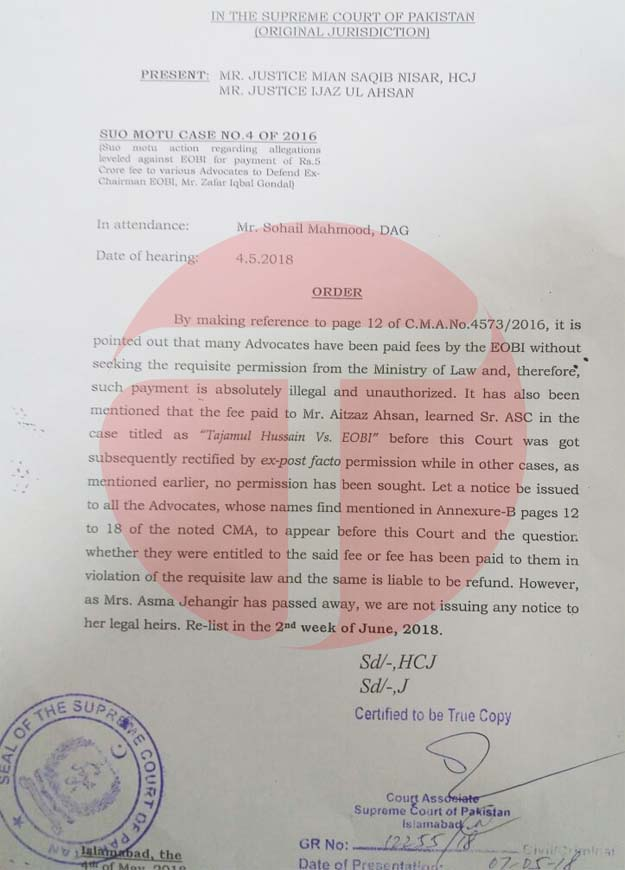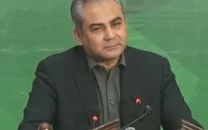EOBI fee case: SC issues notices to two sitting IHC judges, lawyers
SC seeks explanation for charging exorbitant fee while serving as EOBI lawyers

Justice Sardar Tariq Masood, who penned the written order, noted that lower courts had already given a lenient sentence because of Haq’s young age. PHOTO: AFP
A two-judge bench, headed by the Chief Justice of Pakistan (CJP) Mian Saqib Nisar, resumed the hearing of a suo motu case pertaining to the hiring of private counsels by EOBI, issued notices to IHC judges Justice Athar Minallah and Justice Mohsin Akhtar Kayani and other lawyers to explain that how they got fees from the department without the approval of concerned ministry.
SC takes suo motu of mass tax imposed on prepaid mobile bills
According to the rule, the federal departments can not engage any private counsel above Rs100,000 fees without the approval of the relevant authorities.
During the proceedings, Deputy Attorney General (DAG) Sohail Mahmood informed the court that Rs50 million was spent on lawyer fees. He added that the two lawyers were since elevated as IHC judges.
According to the list, Justice Minallah earned Rs850,000 fee on July 31, 2012. Likewise, AQ Law Associate, wherein the latter judge was working a lawyer, earned Rs658,000 by EOBI the same year.
The bench remarked that both should come to explain their position over the payment in the EOBI scandal. It has also been told that the EOBI engaged with different private counsels in 87 cases in violation of rules.
Renowned lawyer Babar Sattar was hired by the department in 34 cases, and earned millions as fee without the approval of said ministry. Likewise Fakhar Zaman Tarar, Ahmed Shehzad Farooq, Sarfraz Ali Metlo, Syed Ahmed Ali Shah, Gohar Ali Khan also appeared in several cases and were paid handsomely. The bench has issued a notice to each lawyer.
DAG Mahmood also submitted that the EOBI engaged Khawaja Haris and Rahseed A Rizvi but they were engaged after the law ministry's approval. Similarly, EOBI engaged Aitzaz in one case with the approval of law ministry, but a second one was not approved.
The apex court later issued a notification in this regard.

Last year, the federal government amended the rules of business, allowing its departments to engage private counsels in consultation with the Attorney General of Pakistan.
The amendments have been made following the issuance of the Supreme Court’s February 8, 2017 verdict, authored by Justice Qazi Faez Isa, who made a strong exception to the practice of the federal and provincial departments for hiring private attorneys in different cases and paying them a huge sum in legal fees from the national exchequer.
The official said that the federal government decided to withdraw its review petition against the judgment after amendment in business rules by the ministry.
He pointed out that the SC, in its paragraph 23 of the judgment, observed that the government may amend the rules for engaging private counsel.
In its verdict, the top court regretted that the government's persistence to engage private advocates for no justifiable reason – a practice that must now stop.
It also directed its office to send a copy of the judgment to the AGP and all provincial advocates general, establishment division secretary, chief secretaries, law secretaries and finance secretaries for their perusal and compliance.
SC takes suo motu notice of delay in accountability judge’s reappointment
Authoring the written judgment, Justice Isa established that if the governments did not follow the order before engaging a private advocate, then any statement made before a court or comments or written statement that are filed would not be binding on the government concerned.
If a government contends that none among its law officers are capable of handling cases, then the question arises as to why incompetent persons were appointed in the first place.
In such a scenario, the masses suffer twice. Firstly, by paying incompetent law officers and secondly, paying again for the services of a competent counsel that the government engages. Currently, around 150 federal law officers are serving across the country.



















COMMENTS
Comments are moderated and generally will be posted if they are on-topic and not abusive.
For more information, please see our Comments FAQ